Why Your Community Needs a Good Quarterback
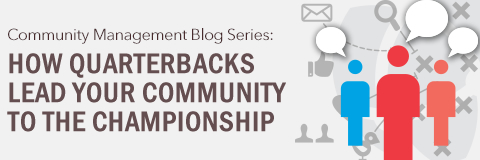
In
Part 1 of this blog series, I introduced the concept that community managers are like quarterbacks. I covered important aspects of the quarterback role: leadership, time management, strategy and knowing your personnel. I then drew parallels to show how the importance of these attributes to community managers and the communities they manage.
Now, let's continue by covering additional aspects of the community management role.
Reasons Community Managers Are Quarterbacks of their Community
Listen to Your Coaches

Photo source: The US Military Academy on
flickr.
While the quarterback is the leader of the offense on the field,
the quarterback is not the coach. There is always an offensive coordinator and head coach to whom the quarterback reports. It helps for the quarterback to be in harmony with the strategic plans of the head coach and offensive coordinator. Ultimately, the coaches have the final say on all issues, so the quarterback has to listen and respect the wishes of the coaches even if they disagree with their viewpoint.
Community managers have a similar relationship. If you’re managing a community, then the community is probably based around some kind of business. Your "coaches" reside in the organization your community represents. Your job is to represent the organization and
carry out the mission for the community set forth by your “coaches.” You may think some of their initiatives or tactics aren’t on target, but you still do as they request. If you do, then you will gain their trust and they will ask you for some “on-the-field feedback.” You can help them see and understand things they may not be able to see from their position.
 "Community managers: build trust in order to gain more responsibility and freedom."
"Community managers: build trust in order to gain more responsibility and freedom."
Keep Perspective of the Bigger Picture
Often times as a quarterback I would
miss some of my reads and completely miss a wide open receiver. This probably happened due to lack of film study, but for whatever reason, I missed a wide open receiver streaking down the field and ultimately I missed a chance to score. By not seeing this receiver I, in a small way, did not help my team.
SIGN UP: Free trial of our online community solution, Evoq Social.

Photo source: Jim Larrison on
flickr.
I simply didn’t see something that I should have. When this happened, my coaches, the ones that were on top of the press box, quickly informed me of my error. They were able to see this more easily because they were elevated and
looking at the game from a different perspective. Looking at the game from a bird’s eye view gave them an advantage and a unique insight as to what was going on in the game.
The same principle can be beneficial for community managers. We can
easily get so caught up on one feature or conversation that we can miss something happening right before our eyes. We might even take actions that don’t align with our community’s mission. Often times I’ll find myself rushing to add new features to my site and in doing so miss new community members joining the site.
For my site to be successful, I need to engage with community members early on in their journey. I sometimes miss out on doing this because I was too focused on a different detail or aspect of my community.
My coaches corrected my errors on the football field. A community manager’s organization may or may not be watching every single interaction on the site so intently. I always try to keep the larger goal of my community in mind and remind myself to take a step back and
see the community from the larger perspective.
 "For long term success, think of the big picture in your community management activities."
"For long term success, think of the big picture in your community management activities."
Share Your Community Management Style
To share on Twitter, click on the quarterback (below) who most resembles your community management style.

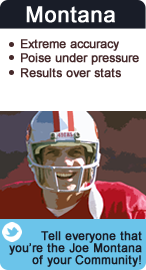
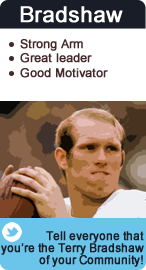
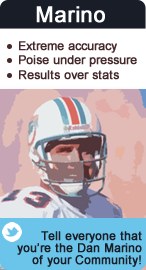
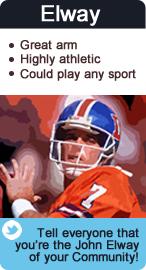
Go to Camp!
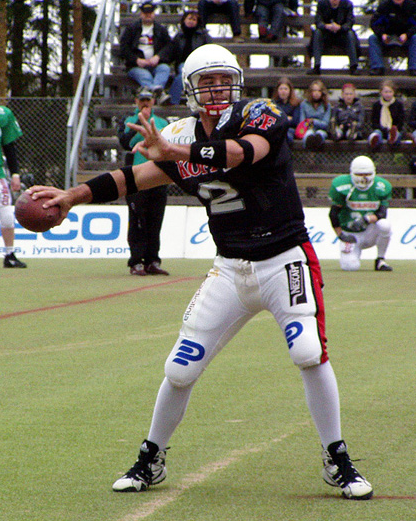
Photo: While my throwing form isn't perfect, I did try to perfect it at quarterback camps.
Summertime for quarterbacks often meant attending quarterback camps. I went to camps to
learn more about throwing fundamentals and quarterbacking in general. While I was there, I not only learned, but I also competed against other quarterbacks from around the state. I made some new friends and sharpened many skills needed to be an effective quarterback. I’m still friends with some of the guys I met at quarterback camp to this day.
The same principle applies to community managers except you don’t have to wait on any off-season to go to camp! The community manager role is growing in prominence, as organizations see the value of having a community around their business. For this reason, more and more community management conferences are starting to pop up and there will definitely be more in the future.
 "Attend community management conferences for learning and professional development."
"Attend community management conferences for learning and professional development."
Some of these conferences or events (such as
Community Manager Appreciation Day) happen online and you don’t even have to go anywhere. Attending these conferences or camps will help you learn more about community management, meet other community managers, and ultimately help you be a better community manager.
Posts on Community Management Events
- Steal These Community Management Tips from CMX Summit Presenters (by colleague @dshiao)
- A Recap of Community Manager Appreciation Day 2014 (by @SFerika)
Scouting and Film Study
Quarterbacks watch a lot of film. In college, we watched hours and hours and hours of game film of our opponents. We did this to
see how they reacted in various situations. We wanted to know exactly what the other team was doing, so we could find out their strengths, weaknesses, and tendencies.
SIGN UP: Free trial of our online community solution, Evoq Social.
If you’re a community manager, why not join some other communities just to see how they operate? Scouting out another community is not illegal and will probably help you learn something. From participating in other communities or simply joining and observing, you can
observe the strengths and weaknesses of that community. This can help you look at things from a totally different perspective and help spawn ideas for your own communities. If you find something you like, find a way to creatively imitate it in your community.
 "Participate in other communities to learn new and creative techniques."
"Participate in other communities to learn new and creative techniques."
Growing and Maturing
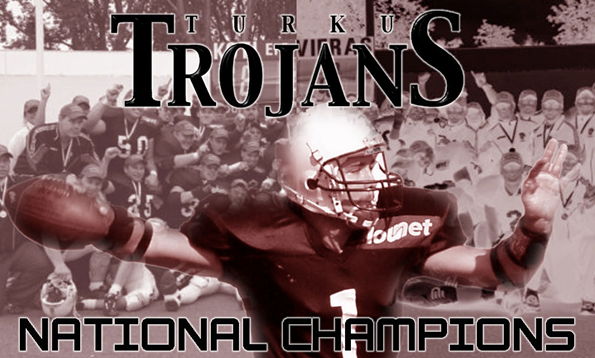
Photo: I played with the Turku Trojans in Finland. We grew and matured our way to the national championship.
It may sound trivial, but you have to mature as a quarterback in order to be successful. Over time, you need to learn to sit in the pocket and read defenses and be a “gun slinger” and you have to take some big hits every now and then. Standing in there when things are collapsing around you will generate
newfound respect from teammates - you'll also build confidence in yourself.
 "In order to be an effective community manager, you must learn and grow in the role."
"In order to be an effective community manager, you must learn and grow in the role."
As you learn and try out different tactics in communities, the same thing happens with community managers. The more you do it, the more confident you get. You need that
confidence and experience to develop as a community manager. Don’t be afraid of throwing an interception. Sometimes it’s good to take a chance. You may fail, but you’ll learn and you won’t make the same mistake twice. If you fail, be sure to fail-forward.
What to Read Next
When dropping back for a pass, a good quarterback goes through a progression, from primary receiver to secondary receiver (and so on). Your primary receiver is Part 1 of this blog series. Your next option is Part 3. Read and enjoy!